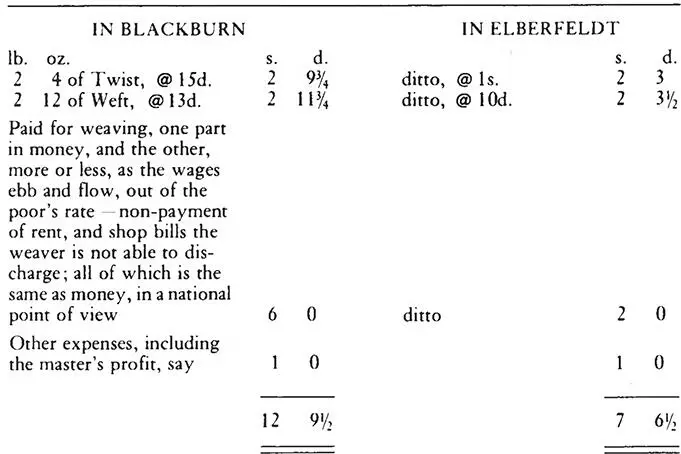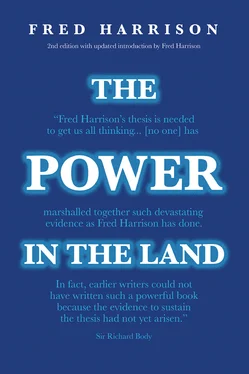Radcliffe was clear about the reason why he originally undertook the risky business of invention, which could have absorbed his capital and left him penniless: the demand for mechanical weaving existed within the industry. At no point in his detailed account of these developments did he complain that entrepreneurs could not obtain bank loans for new investment. Yet despite all his efforts the diffusion of the new technology was painfully slow. Why?
The deterioration in the condition of the weavers began with the termination of what he called the golden years, from 1788 to 1803. The industry went into a decline. Profits and wages were cut back drastically. Within two decades, he recorded, the price of weaving had dropped ‘from 17s. (with a profit of 10 to 20 per cent to the master,) to 4s. to the weaver (and no profit to the master!)’. With the decline in price, the employers were forced to reduce wages: ‘... the masters foresaw the evils this system of lowering the wages would produce, they had no choice left; as they must either go on in this way, or give up their manufacture altogether’. 15 Wages, he declared with emphasis, were below the bread and water level.
The power loom was popularly blamed and attacked as a threat to the employment of weavers. These were men who could hardly be expected to understand the macro-economic forces which were responsible for their pitiable condition. Radcliffe was one of the targets of protest: attempts were made to burn down his factory, and stones were thrown through the windows of his home. 16 This was the time of the Luddites, who wished to smash machines on the assumption that they created hardship rather than increased general welfare. Robert Owen, the utopian socialist, believed that he had demonstrated that mechanisation created an increasing gap between consumption and potential production: he was one of the first economic theorists to advance the under-consumption hypothesis as an explanation of economic recession. But if there was under-consumption, this could not be attributed to a lack of demand. For the workers and their families were hungry and over-worked, their homes were small and mean: there was enormous unsatisfied consumer demand. To blame the economic recession in the 1820s on ‘over-production’ was a perversion of reality.
Radcliffe’s experience with technological innovations during his early years in Mellor convinced him that machines could not be held responsible for the plight of the weavers. ‘Surely there must be some other cause for their distress, than the interference of the new system, which, in fact, has never yet interfered directly with them at all,’ he asked. The new methods of spinning cotton, he pointed out, actually increased the demand for labour and boosted wages. 17 Radcliffe had no doubt about the enemy of his industry: it was that ‘Foreign Anglo Junto’ which conspired in Manchester to carry off the yarn to foreign lands, there to be spun cheaply and sold in competition with British cloth. By imposing a duty on such exports, he repeatedly informed the Lords and Commoners of Parliament, the British weavers would be able to recover the markets which they had lost to foreign manufacturers. Was this thesis correct ?
First, he argued, foreign labour was cheap. In a memorandum to a committee of the House of Commons which he submitted on April 7, 1808, he referred to the foreign manufacturers ‘whose labour might be had at half the price such labour was paid for in this country’. 18 If correct, this would have constituted an advantage to Britain’s competitors, although the difference in wages would have been partly (if not wholly) offset by the cost of transporting the yarn abroad. But this is an implausible argument; Radcliffe himself had noted how the wages of English weavers were below subsistence level. Many of them lived only with the additional support of money from the poor rates. 19 So there could have been no comparative advantage on this score.
What of profits? Foreign manufacturers were not accepting lower returns than the Lancashire millowners. UK profit margins had been cut right down to the bone, and many manufacturers were eventually rendered bankrupt. Radcliffe had predicted this ruin, and had recorded the drop in yields on capital investment. 20 In a breakdown of the costs of producing a piece of calico of 28 yards length he recorded ‘Other expences, including the master’s profit’, at 1s. in both Blackburn and Elberfeldt. 21
There were no significant variations in the level of wages and profits, then, to explain the striking development of foreign weaving — or, to put the problem in a different way, the curious incapacity of British manufacturers to exploit their initial innovative advantage by weaving their own yarn at lower costs than their foreign competitors. So we have narrowed down the analysis to one possible explanation: UK rents were so prohibitively high that domestic manufacturers could not expand their premises and productive capacity. How much truth is there in this hypothesis ?
Blindly — from the analytical viewpoint — Radcliffe failed to perceive the crucial importance of the differences in one of the costs of production. The rents paid by foreign producers were low, 22 while land values in Britain during this critical period of the industrial revolution were very high. The results of this on the cost of production were, in fact, documented by Radcliffe, who cited them for his readers when he gave a breakdown in the cost of producing 28 yards of calico. 23
First cost of a piece of calico , 28 yards long

From this we see that the employers were left with a similar profit, and that the difference in the cost of buying twist and weft (the lower cost to foreign buyers being due to their shrewd dealing, according to Radcliffe) was a few pennies. The major difference is in the cost of labour: 4s. Now, if the weaver of Elberfeldt was paying all his living costs, including rent, out of 2s., and given that there was no significant difference in the wages of the Blackburn and Elberfeldt workers, it appears that the English weavers were paying (or having paid for them out of the poor rates) over 4s. in rent! The difference in costs between the two weaving centres is almost wholly attributable to rent. Radcliffe’s data is consistent with the general economic facts of the period.
This was a time of great prosperity for the owner of land, who was favoured by the increased locational concentration of industries. The rise in rents began in the 1790s, and reached its zenith in the late years of the second decade, between 1813 and 1820. 24 Speculation was rife. Thorold Rogers condemned the land monopoly which enabled owners to exploit the power
which the law confers on corporations and private proprietors to withhold land from the market at a minimum cost. It will be clear that if the law encourages an artificial scarcity, it creates an unnatural dearness. By permitting corporations to hold land in towns, it gives such persons a power of exacting the highest terms possible for the use of their property, by keeping it out of the market till they can enforce their price. To use an American phrase, taken from the slang of speculators, the Russells and the Bentincks, the Cecils, the Portmans, the Grosvenors, and the rest, with the corporations, have had for a long period a ring or corner in the land market, and can force buyers to give famine prices. 25
There can be no doubt that rent rises were making themselves felt. Radcliffe observed that ‘the change from the old system of hand-labour to the new one of machinery operated in raising the price of land ...’ 26 There was, admittedly, a financial burden on the landowners: poor rates were rising. This, however, was something which they could well afford to accept. ‘The rise of the poor rate was certainly vexatious,’ wrote Halévy, ‘but was compensated by the rise of land values. A farm of 100 acres counted for very little, but when this insignificant piece of land became the site of an entire suburb of some large town, the owner found his property better worth having.’ 27
Читать дальше













